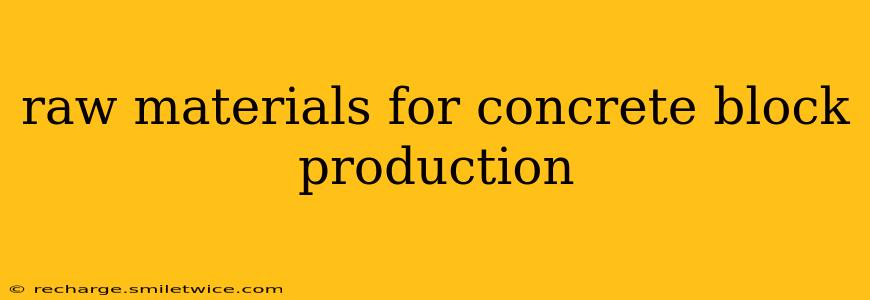Concrete blocks, ubiquitous in construction worldwide, are formed using a blend of readily available raw materials. Understanding these materials is crucial for both manufacturers and those involved in construction projects. This guide delves into the essential components, their properties, and their impact on the final product's quality and durability.
What are the main raw materials used in concrete block making?
The primary raw materials for concrete block production are cement, aggregates (fine and coarse), and water. However, the precise mix and the quality of each ingredient significantly influence the final block's strength, durability, and appearance. Let's explore each component in detail.
Cement: The Binding Agent
Cement acts as the binding agent, holding the aggregates together and creating a strong, cohesive block. Different types of cement, such as Portland cement, are used depending on the desired properties of the final product. The type of cement selected impacts the setting time, strength development, and overall durability of the concrete block. The quality and quantity of cement directly influence the compressive strength of the final product. Using substandard cement can lead to weaker blocks, compromising the structural integrity of any building constructed with them.
Aggregates: The Bulk Material
Aggregates constitute the bulk of the concrete block's volume. They are broadly classified into fine aggregates (sand) and coarse aggregates (gravel or crushed stone).
-
Fine Aggregates (Sand): Sand provides workability to the concrete mix, influencing the ease with which the mixture can be molded and compacted. The quality of sand, specifically its gradation (size distribution), affects the density and strength of the final block. Impurities in sand can negatively impact the block's quality.
-
Coarse Aggregates (Gravel or Crushed Stone): Coarse aggregates contribute significantly to the strength and durability of the concrete block. The size, shape, and type of coarse aggregate influence the overall density and compressive strength. Well-graded coarse aggregates result in stronger and more durable blocks.
Water: The Essential Component
Water is crucial for the hydration process of cement, which is the chemical reaction that causes cement to harden and bind the aggregates together. The water-cement ratio is a critical factor affecting the strength and workability of the concrete mix. Too much water can lead to weak and porous blocks, while too little can result in a difficult-to-work-with, non-uniform mix.
What are some additives used in concrete block production?
Beyond the primary materials, various additives are often incorporated to enhance specific properties of the concrete blocks. These include:
-
Air-entraining agents: These introduce microscopic air bubbles into the mix, improving the block's resistance to freeze-thaw cycles in cold climates.
-
Water reducers: These chemicals reduce the amount of water needed for a given workability, leading to stronger and more durable blocks.
-
Accelerators: These speed up the setting and hardening process, allowing for faster production.
-
Color pigments: These are added to achieve specific aesthetic effects.
What is the impact of raw material quality on the final product?
The quality of the raw materials directly impacts the final product's performance. Using substandard materials can lead to:
- Reduced strength: Weak blocks may not withstand the loads they are designed to support.
- Increased porosity: Porous blocks are more susceptible to water absorption, leading to freeze-thaw damage and reduced durability.
- Uneven appearance: Inconsistent raw material quality may lead to blocks with uneven color or texture.
- Reduced durability: Blocks made with poor-quality materials may not last as long.
How do I choose the right raw materials for concrete block production?
Selecting appropriate raw materials requires careful consideration of several factors:
- Local availability and cost: Choosing readily available materials can reduce transportation costs and lead times.
- Required strength and durability: The choice of cement and aggregates should align with the intended application and required performance characteristics.
- Environmental impact: Consider the sustainability aspects of the chosen materials.
By carefully selecting and controlling the quality of raw materials, manufacturers can ensure that the resulting concrete blocks meet the required standards for strength, durability, and appearance, contributing to safer and more resilient constructions.
